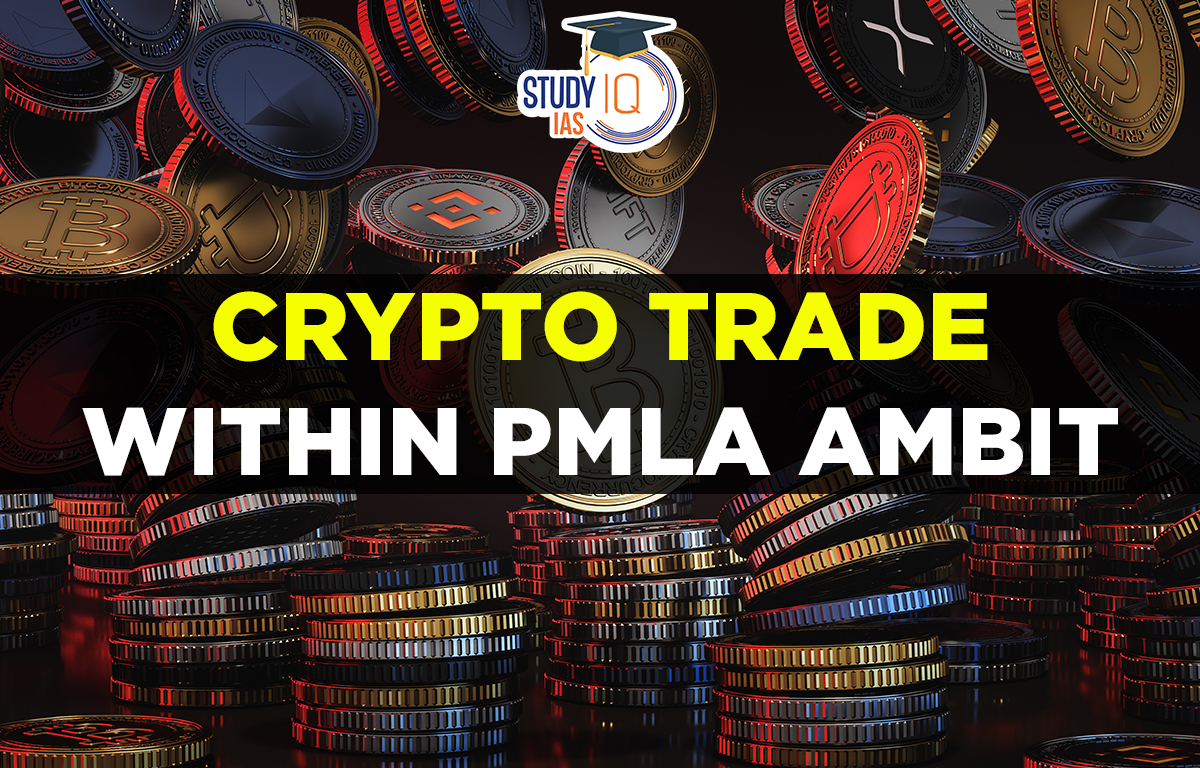Table of Contents
Context: The Finance Ministry recently issued a notification stating that all virtual digital assets (VDAs) will come within the ambit of the Prevention of Money Laundering Act, 2002 (PMLA).
More on Crypto Trade within PMLA Ambit News
- The move to bring VDAs within the ambit of PMLA is aimed at further tightening the loosely regulated crypto market.
- The value of all existing cryptocurrency is about $804 billion as of 2023 which is about twice the GDP of Singapore in 2021.
- In India, over 10 crore Indians have invested in cryptocurrencies.
- Illegal use of cryptocurrencies hit a record $20.1 billion last year. Transactions associated with sanctioned entities jumped over 1,00,000-fold, making up 44% of last year’s illegal activity.
- Therefore, the current move means that Indian crypto exchanges will have to report any suspicious activity related to buying or selling of cryptocurrency to the Financial Intelligence Unit – India (FIU-IND).
- This central agency is responsible for receiving, processing, analysing, and disseminating information related to suspicious financial transactions to law enforcement agencies and overseas FIUs.
- In its analysis, if the FIU-IND finds wrongdoing, it will alert the Enforcement Directorate.
- Under Section 5 and 8(4) of the Act, the ED has discretionary powers to search and seize suspected property without any judicial permission.
Prevention of Money Laundering Act
- The anti-money laundering legislation was passed by the government in 2002, and came into force on July 1, 2005.
- The PMLA was showcased as India’s commitment to the Vienna Convention on combating money laundering, drug trafficking, and countering the financing of terror (CFT).
- The law was aimed at curbing the process of converting illegally earned money into legal cash.
- The Act empowered the Enforcement Directorate (ED) to control money laundering, confiscate property, and punish offenders.
Money Laundering
- Money laundering is the process of converting black money into white money.
- It involves the process of hiding the source of money obtained from illegal sources and converting it into clean money (thereby making it appear to have come from a legitimate source).
- Example: Suppose a criminal or criminal organization owns a legitimate restaurant business. Money obtained from illegal activities (such as drug trafficking) is gradually deposited into a bank through the restaurant. The restaurant reports daily cash sales much higher than what it actually takes in. It earns around 10K daily but deposits 20k in the bank. The money thus deposited appears legitimate.
Implication of the Move
- The provisions under Prevention of money laundering act will be enforceable against anyone involved in the dealing of Virtual digital currency. For example, crypto exchange, entities involved in converting fiat money into cryptos, entities involved in the management of cryptos etc.
- The entities (i.e. those dealing with Virtual digital currency) will have to follow certain guidelines such as:
- Conducting KYC: The entities dealing with Virtual digital currency will have to conduct KYC (Know your customer) for all of their customers.
- Maintenance of records: The entities will have to maintain the records of all the transactions which are undertaken by them.
- Reporting suspicious transaction: The entities will have to report all suspicious transactions to the Finance Intelligence unit.
- The entities (i.e. those dealing with Virtual digital currency) will have to follow certain guidelines such as:
Virtual Digital Assets
- Virtual Digital Assets: The definition of Virtual digital asset had been provided under section 2 (47A) of the Finance act 2022.
- It defines a virtual digital asset as any data, code, number, or token generated using cryptography or another method and has certain value.
- Example: Well known examples of Virtual digital assets are bitcoins, cryptocurrency, Non fungible tokens.
Global Regulations
- Most countries have already brought digital assets under anti-money laundering laws.
- Singapore, Japan, Switzerland, and Malaysia have legislations on regulatory framework.
- The U.S., U.K., Australia, and Canada have initiated plans on regulating.
- So far, China, Qatar, and Saudi Arabia have issued a blanket ban on cryptocurrency.
- The EU is also preparing a cross-jurisdictional regulatory and supervisory framework for crypto-assets.
- The framework seeks to provide legal clarity, consumer and investor protection, and market integrity while promoting innovation in digital assets.
Related Information
There are certain key facts one should know which are important from the perspective of the examination:
- Implementation agency for PMLA: The provisions under Prevention of money laundering act are implemented by the Enforcement Directorate.
- About Enforcement Directorate: There are certain key facts one needs to know about Enforcement Directorate which are as follows:
- It is a multi-disciplinary organization mandated with investigation of economic crimes and violations of foreign exchange laws.
- It is an executive agency under the Department of Revenue, Ministry of Finance (GoI).
- Functions of ED: It enforces provisions of following laws –
- The Foreign Exchange Management Act, 1999
- The Prevention of Money Laundering Act, 2002
- The Fugitive Economic Offenders Act, 2018
- Role of ED in relation to PMLA, 2002: The ED has been given responsibility to enforce the provisions of the PMLA by conducting investigation.
- To trace the assets derived from proceeds of crime,
- To provisionally attach the property, and
- To ensure prosecution of offenders and confiscation of property by the Special Court.
- Important facts about the ED: Following key facts one should know about PMLA:
- It is not classified as a police agency.
- This means that ED is not bound by the procedures and standards set for criminal investigation under the Criminal Procedure Code, 1973 (CrPC).
- The ED enjoys unique power to compel accused persons to make self-incriminating statements by imposing a fine on accused persons who are withholding information or lying.


 Daily Quiz 17 April 2025
Daily Quiz 17 April 2025
 Nilgiri Biosphere Reserve, Map, Climate,...
Nilgiri Biosphere Reserve, Map, Climate,...
 Complete List of Indian State Animals
Complete List of Indian State Animals





















